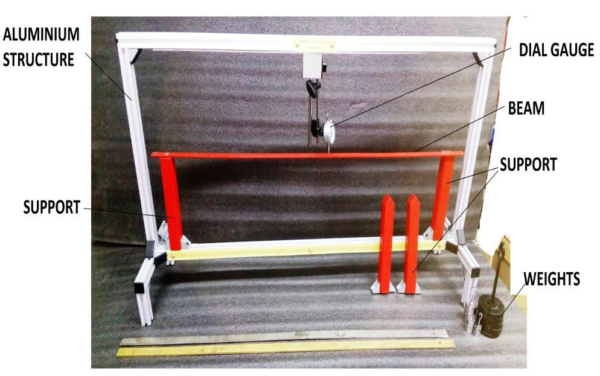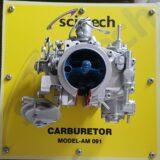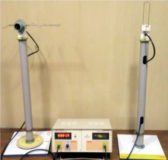Bending Moment Apparatus Model MT 069
Home » Products » Bending Moment Apparatus Model MT 069
Bending Moment Apparatus Model MT 069
Sci-tech Bending Moment Apparatus Model MT 069, experimental beam is in two parts, joined together by a pair of low friction ball bearings. An under slung spring balance provides a resisting moment, and also allows the section bending moment to be measured. A hinged metal strip to simulate the loading pattern of paneled girder for a more advanced experiment on influence lines is available. The beam is simply supported on end bearings and several weight hangers can be attached at any position on either side of the hinge. This equipment is part of a range designed to both demonstrate and experimentally confirm basic engineering principles. Great care has been given to each item so as to provide wide experimental scope without unduly complicating or compromising the design. Each piece of apparatus is self-contained and compact. Setting up time is minimal, and all measurements are made with the simplest possible instrumentation, so that the student involvement is purely with the engineering principles being taught. Students can apply loads to hangers suspended along the beam, held between two supports One support allows rotational movement only, acting as a pinned support and the other support allows translational movement, acting as roller support The load cell at the cut at mid-span of the beam measures the bending moment due to the load Includes a uniformly distributed load (UDL) that may be applied across the span of the beam for comparison of results with a single point load
| Size: | 120cm x 60cm x 95cm (LxWxH) |
| Weight: | 20 kg |
Item Description
Features
- Low cost, effective teaching
- Self-contained
- Bench mounted
- Experimental determination of bending moment at a beam section
- Loads and supports can be placed in any position
- Visual verification of the nature of bending moment
- Allows investigation of stability and influence lines
- Reinforces concept of equilibrium of vertical forces and moments
- Optional DAQ with ‘LabView’ interface
- Optionally Includes multiple loads for many combinations of loads including uniformly distributed loads
- Optional storage tray to keep smaller items safe
A length of material supported horizontally and carrying vertical loads is called a beam. The loading causes bending and transverse shearing. The loads and reactions are the ‘external’ forces acting on the beam. They must be in equilibrium. However, the strength of the beam depends on ‘internal’ forces or moments. This experiment demonstrates the nature of these internal forces and their dependence on the external system of forces.
The experimental beam is in two parts, joined together by a pair of low friction ball bearings. An under slung spring balance provides a resisting moment, and also allows the section bending moment to be measured. A hinged metal strip to simulate the loading pattern of paneled girder for a more advanced experiment on influence lines is available.
The beam is simply supported on end bearings and several weight hangers can be attached at any position on either side of the hinge.
This equipment is part of a range designed to both demonstrate and experimentally confirm basic engineering principles. Great care has been given to each item so as to provide wide experimental scope without unduly complicating or compromising the design. Each piece of apparatus is self-contained and compact. Setting up time is minimal, and all measurements are made with the simplest possible instrumentation, so that the student involvement is purely with the engineering principles being taught.
Students can apply loads to hangers suspended along the beam, held between two supports
One support allows rotational movement only, acting as a pinned support and the other support allows translational movement, acting as roller support
The load cell at the cut at mid-span of the beam measures the bending moment due to the load
Includes a uniformly distributed load (UDL) that may be applied across the span of the beam for comparison of results with a single point load
Optionally, ‘Sci-Cal’ computer interface & sensors to DAQ software with ‘LabView’ offered.
A complete instruction manual is provided describing the apparatus, its application, experimental procedure and typical test results.
See also different:

Sci-tech Basic Satellite Communication Trainer Model TCM 006 is the first of its kind using actual techniques of satellite communication. It can uplink a given signal to a satellite link emulator, which can be stationed far away. The satellite [...]



